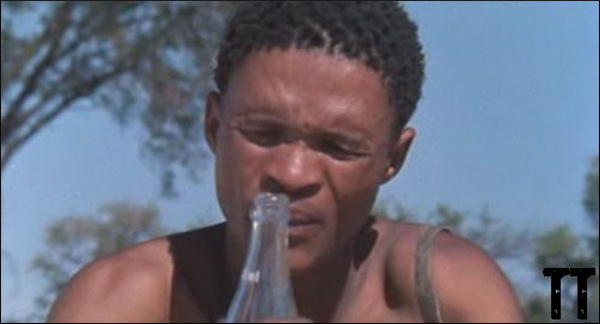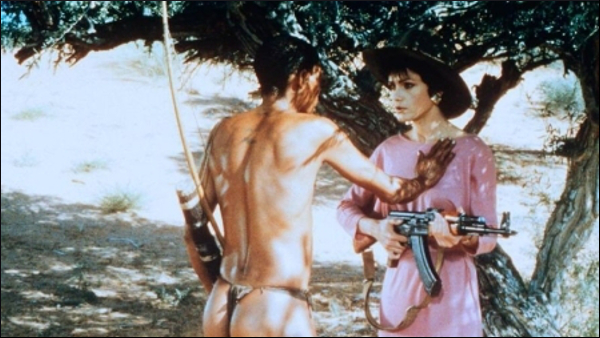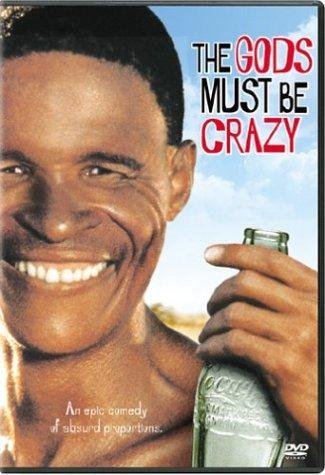The Gods Must Be Crazy is definitely one of South Africa's all-time top classic movies. Written, directed, and produced by Jamie Uys, and released in 1980, it broke box-office records in Japan, South America, Europe, and even in North America, in 1984. The film earned the Most Popular Film mention at the Montreal World Film Festival in 1983 and, in 1985, it won the Special Award for Best Foreign Film at the Young Artist Awards.
Paddy O'Byrne narrates a brief introduction of the Kalahari Desert, explaining why it is so devoid of people. This part of the movie shows the daily lives of the only inhabitants of the Kalahari, the Bushmen, fondly known as the “Little People.” We see their various survival techniques, such as how and where they find water, cure snake skins, and fill their days believing that everything surrounding them is provided by their gods. They are bereft of nothing, and have no knowledge of ownership, jealously, or greed. They only know peaceful existence with nature and their gods.
"The Gods Must Be Crazy is definitely one of South Africa's all-time top classic movies."
This introduction then crosses over to a satirical description of civilized man, who has named certain days on which to do certain tasks at certain times. He sends his children away to learn how to survive in this man-created society, while struggling to make enough money and living totally outside nature. Often, the result of civilization is that people become quite mad. A reporter from Johannesburg, Kate Thompson, played by Sandra Prinsloo, decides to quit her career and teach at a school in Botswana after her co-worker asks her, "Does the noise in my head bother you?" The star of the movie, Xi, discovers a Coca Cola bottle, which he believes has been dropped by the gods. At first, the bottle is useful to Xi and his family, but soon one bottle is not enough and fighting erupts, bringing much shame upon them. At the campfire, Xi expresses that the gods must have made a mistake. He undertakes to venture to the end of the earth the following morning, in order to explain to the gods that the Coca Cola bottle has only brought pain and malice to his family.

The movie then ventures 2000 miles up north, where Sam Boga leads a bunch of guerrilla terrorists. Having killed three cabinet members in a failed attempt on the President’s life, Sam leads his men south in an attempt to cross the border. Meanwhile, Kate is picked up at a Botswana bus stop by Andrew Steyn, who was sent there by the local reverend (played by Jamie Uys). While both travel to the school, their Land Rover breaks down while crossing the river. At night, both sit around a campfire having dinner, and while having an awkward conversation, Steyn sees a Rhinoceros rushing towards them. He flings both of them into a nearby bush, and Kate flees deeper into the bush, unaware of the Rhinoceros. This animal is the self-appointed firefighter of Africa, and stamps out the campfire. When Kate finally reaches a place of safety, she sees Steyn putting out the last smoldering embers of the fire. She refuses to listen to his theory that he did this only to prevent the Rhinoceros from returning, and comes to believe that there is something definitely wrong with the man.
While Steyn tries to build another fire to prove his theory, two Batswana men (plural form) arrive and greet them in the spoken language of Setwana, saying “ Dumela ,” which means “Hello.” Steyn replies, “ Ke itumelela go goitsi ”, and the men and Steyn then clap their hands and repeat this phrase, which means, “Pleased to meet you.” Batswana’s are most known for their melodic mannerisms, something Jamie Uys portrays beautifully in this scene. The following morning, Steyn manages to winch his vehicle out of the river, although further mishaps await the pair. Meanwhile, Xi is soon arrested for stock theft when he shoots a buck for food. Steyn’s assistant, M’pudi, is sent as translator in the court case, and convinces Steyn to employ Xi as a means for the Bushman to serve out his eleven-week sentence. At the same time, Sam Boga captures Miss Thompson and her schoolchildren, using them as human shields to guarantee safe passage to the country’s borders.
"A satirical description of civilized man, who has named certain days on which to do certain tasks at certain times. He sends his children away to learn how to survive in this man-created society, while struggling to make enough money and living totally outside nature."
As this humorous movie unfolds, it gives much insight into the fauna, flora, and cultural diversity of South Africa. However, the wait-a-bit tree, also known as Acacia greggii, which is mentioned in the movie, is not common to Africa at all. The Acacia tortilis, commonly known in Afrikaans as the “ haak-en-steek ” (hook and stab) is more likely to be the tree featured in this movie, and is well-known for capturing passers-by. The movie was shot mostly in Botswana, except the "end of the earth," which was shot at God’s Window, the border between the Highveld and Lowveld, found in eastern Mpumalanga, South Africa.





